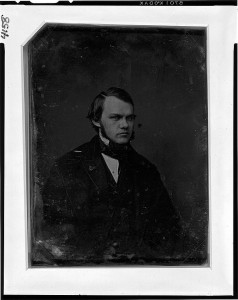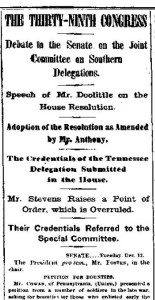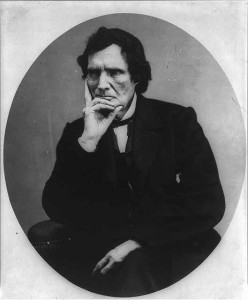From the Richmond Daily Dispatch December 13, 1865:
Associated Press dispatches.
Congressional proceedings.
Washington, December12.
–Senate.–Mr. Davis, of Kentucky, offered a resolution, which was referred to the Judiciary Committee, declaring that whereas there is no longer rebellion in the limits of the United States, therefore the privilege of the writ of habeas corpus is restored in every State.
The Senate resumed the consideration of the House resolution providing for the appointment of a joint committee of fifteen to inquire into the condition of the States which formed the so- called Confederacy, and report whether they, or any of them, are entitled to be represented in either House of Congress. The resolution was amended and passed — ayes, 33; nays, 11. The Senate then adjourned.
House of Representatives.The Speaker submitted a communication from the Governor Virginia, enclosing an act of the General Assembly in favor of the repeal of the act giving the consent of the Legislature of Virginia for forming the new State of West Virginia. Referred to the Judiciary Committee.
Mr. Raymond presented the credentials of the members elect from Tennessee.
Mr. Stevens objected, saying that the State of Tennessee was not known to the House.
The Speaker overruled the objection.
Mr. Raymond said there were many facts connected with Tennessee, past and present, which commended its case to the early consideration of the House.
Several gentlemen wanted the Tennessee members at once admitted, lauding them for their patriotism during the war.
The House referred their credentials to the joint committee of fifteen on the condition of the late Confederate States–yeas, 125; nays, 42.
A resolution was passed inviting the members elect from Tennessee to occupy seats in the Hall of Representatives. Pending the decision of their case, the House then adjourned.
From the day the Thirty-Ninth Congress assembled, it was clear the Republican majority harbored misgivings about what [President] Johnson had accomplished. Clerk of the House Edward McPherson omitted the names of newly elected Southern Congressmen as he called the roll, and the two Houses proceeded to establish a Joint Committee on Reconstruction to investigate conditions in the Southern states and report whether any were entitled to representation. (They also denied Southern claimants living expenses, leaving them, one remarked, the alternatives “go home or starve.”) To Johnson, these decisions in effect admitted that the South had actually left the Union, and many of his supporters spoke darkly of a Radical coup. Yet the Republican caucus had approved the Southerners’ exclusion by a nearly unanimous vote, and the committee’s membership was carefully balanced among the party’s factions. Moderate Sen. William Pitt Fesseden occupied the chair, while Sumner, considered “too ultra,” was left off entirely.[1]
- [1]Foner, Eric. Reconstruction: America’s Unfinished Revolution, 1863-1877. New York: HarperPerennial, 2014. Updated Edition. Print. page 239.↩



